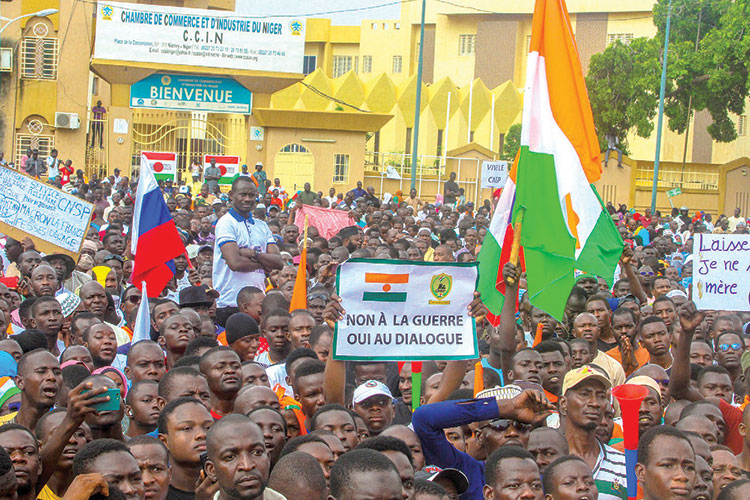Niger Crisis: Algeria’s Diplomatic Moves Block Military Intervention

Algeria succeeded, so far, in reaching a consensus with members of the Economic Community of Western African States (ECOWAS) on the situation in Niger.
Algeria called for the need to move towards political understanding between all parties and reject military interventions that would “explode the region as a whole.”
Foreign Minister Ahmed Attaf completed a lengthy tour that led him to three countries in the “ECOWAS” group, namely Nigeria, Ghana and Benin, which were among the most enthusiastic about the need for military intervention in Niger to end the coup against President Mohamed Bazoum, but discussions with officials of those countries showed great convergence positions with what Algeria has expressed since the beginning of the crisis, which is the categorical rejection of military intervention, the effects of which are still witnessed in Libya a decade later, the need to return to constitutional legitimacy, and the rejection of the transfer of power by force.
“Algeria refuses to resort to the use of force in the Niger crisis,” said the Algerian diplomacy official, at the end of his tour and meeting with the Ghana President, Nana Akufo-Addo, explaining that the talks with the Ghanaian president were fruitful and that there was complete agreement in the views between the two countries and the two presidents.
Attaf revealed the goals set by President Tebboune regarding the Niger crisis, which is represented in “ensuring full and strict respect for the African legal framework related to unconstitutional changes of governments, with an emphasis on Algeria’s full adherence to the principle of prohibiting and rejecting unconstitutional changes of government, in which our country had a role in crystallizing and consolidating it on the African continent on the occasion of the Organization of African Union summit in Algiers in 1999″.
At the outset of his mission, whose first destination was Nigeria, which holds the presidency of the “ECOWAS” group, Attaf stressed that the authorities in Abuja “adopted” the proposal presented by President Tebboune regarding the crisis in Niger, adding that: “The talks with the brothers in Nigeria confirmed, indeed that these four criteria are the subject of great agreement and a subject of greater consensus that would facilitate the activation of the principle of African solutions to Africa’s problems, in dealing with the Niger crisis”.
To this end, he explained; “We emphasized that Algeria and Nigeria can only work together, hand in hand, side by side, to avoid aggravating the situation in Niger, the region and the entire African continent,” adding that it was also emphasized categorically that “we will not tolerate any violation of democracy and the constitutional system in Niger, and that preserving the security and stability of Niger and the well-being of its people requires us to make more efforts and sacrifices individually and collectively, and that we will spare no effort in activating a peaceful and political solution to the crisis in Niger”.
Ahmed Attaf also reviewed, with his Beninese counterpart, Olushegun Adjadi Bakari, the developments of the current crisis in Niger and ways to contribute to calming the situation and working to achieve a return to constitutional order in the country to preserve its security and stability. The two parties affirmed, in this context, their adherence to the legal controls of the African Union aimed at addressing the scourge of unconstitutional changes of governments that were established during the Pan-African Summit held in Algiers in 1999″, which indicates that Cotonou has put “the option of military intervention in the drawer”.
Algeria had previously held extensive talks with the U.S. administration, where it was emphasized, in the meeting between Attaf and his counterpart Blinken, “the consensus of the two countries’ positions in favour of a peaceful solution in Niger,” and the same decision was taken with the European Union, where the two sides called for “the necessity of uniting political and diplomatic pressures to ensure restoration of constitutional order in Niger”.
In his reading of the Algerian move to quell the voice of the threat of war in Niger, Professor of Political Science and International Relations, Radouan Bouhidel, said; “The Algerian move is necessary and not optional, given that Niger and the Sahel region as a whole are its strategic depth, and it is necessary to move towards not repeating what happened in 2011, after the overthrow of Muammar Gaddafi, which would increase the risks of armed groups and terrorism, organized crime cells, illegal immigration, and the militarization of the region even more than it is.”
Professor Bouhidel believes, in an interview with Echorouk, that the Algerian endeavour has begun to show fruit, as he confirmed that the threat of military intervention has subsided somewhat, especially since information transmitted by the national radio spoke of the imminent military intervention, with French engineering and supervision.
Bouhidel confirmed in this regard that “the diplomatic move began to show its fruits by softening the positions in the (ECOWAS) countries after they were impulsive towards the necessity of military intervention, and all the statements were indicative of that, under French pressure that cannot be denied or hidden.”
“Today on the ground it appears that Attaf visited three countries that cannot carry out a military intervention, just as France failed in principle to establish a proxy war in the African Sahel region,” he added.
Regarding the indications of failure to move towards military intervention, Bouhidel explains that “the military intervention has become a burden in practice due to the inability of the (ECOWAS) group to implement it on its own and its high financial cost, with Algeria refusing to open its airspace to French planes. There is a popular rejection of France, which suggests the possibility of losing the last areas of its influence on the African Sahel”.






